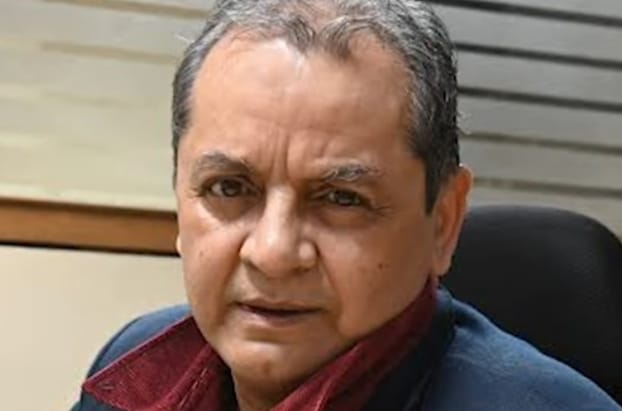
Sankarshan Thakur💐💐
On September 8, 2025, India lost one of its most fearless and compassionate journalistic voices – Sankarshan Thakur, editor of The Telegraph, passed away at the age of 63   .
Born in Patna in 1962, he was the son of veteran journalist Janardhan Thakur. A graduate of Hindu College, Delhi University, where he studied political science, his early life was shaped by curiosity, conviction, and an abiding sense of purpose.
Beginning his journalism career with Sunday magazine in 1984, Thakur embarked on a path that would see him report from the most tumultuous corners of India and beyond  . His early exposure not only honed his craft but also forged an indomitable spirit that stayed with him to the end.
On the Ground, Beyond the By-line: Reporting from the Fronts of History
Sankarshan Thakur built his reputation on immersive, high-stakes reporting. From the chaos of the Bhopal gas tragedy, the flames of the 1984 anti-Sikh riots, to the assassination of Indira Gandhi, the Sri Lankan civil war, and a Maldives coup—he chronicled it all with both pen and heart.
He was a familiar face on the Kargil warfront in 1999, and he later turned his gaze to the valleys of Kashmir, becoming known not just as a reporter but as a listener—one who stayed with people in their homes and felt their pulse rather than reporting from afar.
A fellow journalist, Saba Naqvi, recalled a shared moment during the 2024 general elections in Varanasi: “We had both been in the field in excruciating heat… That’s what makes a great journalist.” Her words resonate with the essence of Thakur’s legacy.
Editorial Stewardship and Literary Legacy
Thakur’s ascent in the world of newsroom leadership was marked by a steadfast commitment to journalistic integrity. He held senior editorial roles at The Indian Express and Tehelka, where he served as Executive Editor during the magazine’s launch in 2004  . Eventually, he returned to The Telegraph—first as Roving Editor, then National Affairs Editor, and finally as its Editor in 2023.
Parallel to his editorial influence, Thakur was a prolific author of political biographies that shed light on the soul of Bihar’s politics. His notable works include:
•Subaltern Saheb: The Making of Laloo Yadav, The Unmaking of Bihar (also published as The Making of Laloo Yadav…, later reprinted as Subaltern Sahib).
•Single Man: The Life and Times of Nitish Kumar of Bihar.
•The Brothers Bihari, a dual biography of Lalu Prasad Yadav and Nitish Kumar, released in 2015.
These works weren’t just biographies—they were narrative prisms that refracted the complex interplay of caste, power, and politics through elegant prose and rigorous insight.
Honours and Recognition
Thakur’s fearless reporting and analytical depth earned him prestigious recognition through the Prem Bhatia Award for Excellence in Political Journalism in 2001 and the Appan Menon Fellowship in 2003, the latter supporting his work on a book about Kashmir.
He was also invited as a Poynter Fellow in Journalism at Yale University in October 2024, where he addressed themes of India’s political future post-2024 elections, reflecting his global recognition as a journalist par excellence.
The Ripple of Departure: Tributes and Collective Mourning
The news of Thakur’s passing struck a deep chord across political and journalistic circles.
Jairam Ramesh mourned: “His numerous articles on Bihar as well as J&K established his reputation… liberal, democratic, secular, and pluralistic India has lost one of its strongest defenders”.
The Press Club of India saluted him as “a fearless voice in journalism” whose “sharp political analysis and unwavering commitment to the truth will be deeply missed” . Manoj Kumar Jha, RJD MP, added: “A quiet lamp has gone out, and yet its glow will not fade… he walked the thin line between reportage and resistance with rare integrity” .
Shashi Tharoor lauded his “legendary political reportage and masterful books,” calling him “one of the greats” who brought the political landscape to life with empathy and clarity. Raj Kamal Jha of The Indian Express remembered him as both “a friend and conscience” .
From the ground, Mandeep Punia called him “among the first in the league of editors with a spine in India,” and others recalled his unmatched depth in understanding Bihar and Kashmir  .
Final Reflections: A Legacy That Will Endure
In chronicling four tumultuous decades of Indian journalism, Sankarshan Thakur embodied the highest stakes of the craft—not just the pursuit of facts, but the pursuit of truth with grace, empathy, and conviction.
He chose to sweat in the field, to earn trust in homes rather than palaces, and to free his words from the shackles of influence. He carved narratives not only through headlines but through the hearts of readers who sought clarity in complexity.
He leaves behind a rich legacy of reportage, editorial leadership, and writing that will continue to guide aspiring journalists and thoughtful citizens. While his pen is stilled, his voice echoes.
May he rest peacefully.💐
Indian journalism loses a conscience, but gains a legend.
Hasnain Naqvi is a former member of the history faculty at St. Xavier’s College, Mumbai





